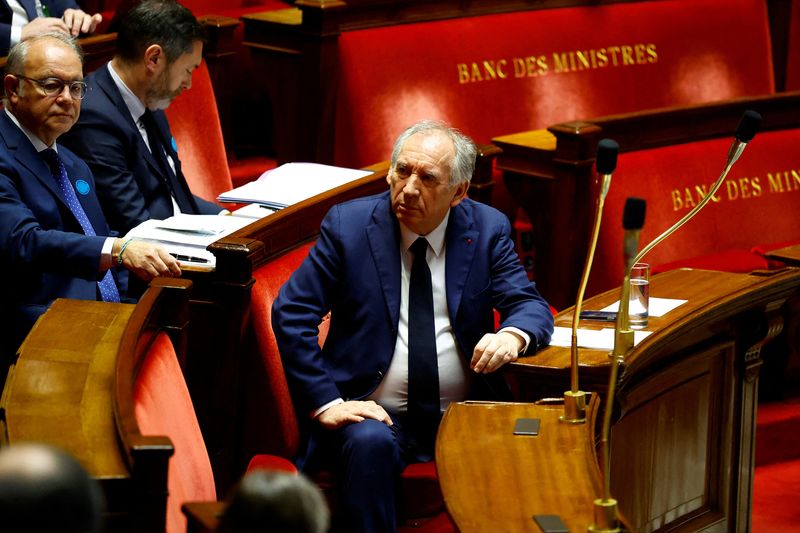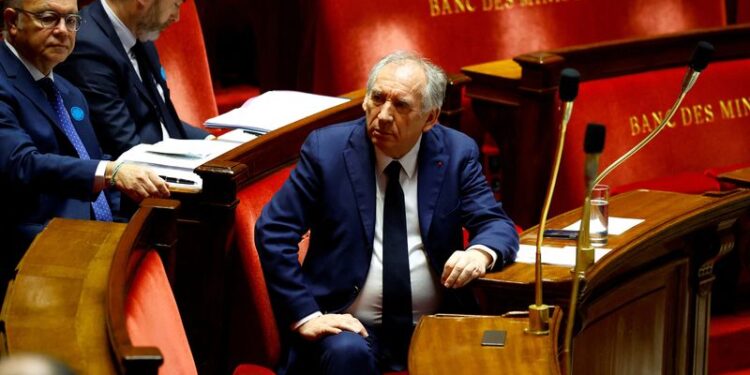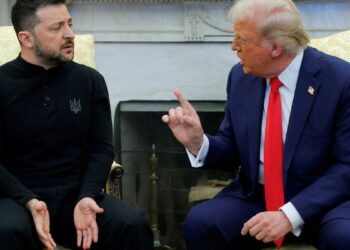By Sudip Kar-Gupta and Gabriel Stargardter
PARIS (Reuters) -France unveiled a new government on Monday composed of former ministers and senior civil servants that Prime Minister Francois Bayrou will hope can oversee the passage of a 2025 budget and prevent a deepening of the country’s crisis.
Eric Lombard, 66, the head of Caisse des Depots, the investment arm of the French government, became finance minister, working with Amélie de Montchalin as budget minister.
They will need to begin work immediately with Bayrou on passing a 2025 budget bill after parliamentary pushback over the proposed legislation led to the toppling of Bayrou’s predecessor, former Prime Minister Michel Barnier.
Bayrou’s new team will be under immediate pressure to slim down a deficit expected to end the year at above 6% of gross domestic product.
Parliament is in recess until January 13. Once lawmakers return, however, Bayrou and his team will likely be living day-to-day, under the constant threat of no-confidence motions.
French President Emmanuel Macron will hope Bayrou can stave off no-confidence votes until at least July, when France will be able to hold a new parliamentary election.
Bayrou had struggled for 10 days to put together a government as he looks to stave off potential no-confidence votes from the far right and left.
In his other appointments, Conservative Bruno Retailleau remained interior minister, while Foreign Minister Jean-Noel Barrot and Defence Minister Sebastien Lecornu also remained in their posts.
Élisabeth Borne, who stepped down as prime minister in January, became education minister, while former interior minister Gerard Darmanin will lead the Justice Ministry.
IMMEDIATE PRESSURE
France’s failure to pass a belt-tightening 2025 budget has spooked investors and ratings agencies, but the savings needed to get France’s public finances in line have proven too much for lawmakers in the deeply divided parliament.
Bayrou has had a rough start since he was named prime minister on Friday, Dec. 13.
He came under fire for flying on a private jet to the southwestern town of Pau, where he remains mayor, to attend its council meeting, while leaving his interior minister to fly to the storm-ravaged overseas territory of Mayotte.
An opinion poll published on Dec. 19 found 64% were dissatisfied with his appointment as prime minister.
Last week, he invited all mainstream parties for talks to form a government, excluding the far-right National Rally and hard-left France Unbowed.
The offer, combined with a proposal to unions to jointly come up with a new version of a much-contested pension reform passed in 2023, has received only lukewarm support from parties ranging from the Socialists to the conservatives.
Green party leader Marine Tondelier, who has been pushing for the left to be given the opportunity to govern since snap elections delivered a hung parliament this summer, said the left would remain in opposition. The Socialists and Communists also turned down the offer to join his cabinet.
LOMBARD TOO CLOSE TO MACRON?
Bayrou’s choice of Lombard could also prove problematic.

Before joining the CDC, Lombard was a senior banker at BNP Paribas (OTC:). Between 2013-17, he worked at Generali (BIT:) France, ending up as the chief executive of the insurance firm.
He is seen as an impressive technocrat with deep experience in the upper echelons of the public sector and private financial institutions. However, he may be vulnerable to accusations that he leans too far left politically, and that he is too close to the deeply unpopular Macron.







